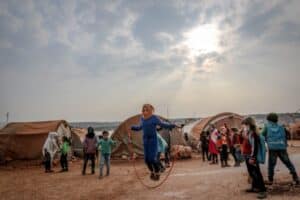This page contains affiliate links. This means if you a follow a link and make a purchase, at no additional cost to you, Humanitarian Careers will receive a commission. Thank you for supporting the site.
When applying for a job in humanitarian aid, your cover letter will be a key part of your application. Alongside your CV, your cover letter is the main document NGO recruiters use to decide whether to short-list you for an interview. It’s crucial your cover letter shows the NGO recruiter that you’re a strong candidate with the skills needed to do humanitarian work.
This complete guide breaks down the 12 key steps in writing a successful cover letter for a humanitarian job application. Follow these steps in order to get a full breakdown of what you should, and should not, include in your cover letter for a job in humanitarian aid.
Keep Your Cover Letter to One Page
Your cover letter for a humanitarian job needs to capture the NGO recruiter’s attention. Humanitarian work is competitive and NGO recruiters will receive a lot of applications.
Often a recruiter will scan your CV to see if you have the experience and qualifications needed for humanitarian work, before turning to your cover letter. Although your cover letter should expand and explain your CV, it should also be direct and to-the-point as humanitarian work recruiters simply do not spend much time reviewing each application.
Your cover letter as part of an application for a humanitarian job should definitely be less than one page. Aim for 350 to 500 words and write in font size 12. Keep the font clear to read and professional.
A cover letter more than one page, or over 500 words, is simply too long for the humanitarian work recruiter to take time on and may actually mean they skip over your application. A good rule for humanitarian cover letters is actually the shorter the better, as long as you can convey the to the NGO recruiter you are a strong candidate for humanitarian work.
As well as making sure that your humanitarian job application cover letter is less than one page, it is also important to ensure it is professional. Begin the letter with ‘Dear Sir/Madam’ and close it with ‘yours faithfully’ – this is formal letter writing etiquette.
Make sure your cover letter is broken into paragraphs with each covering a specific area of your experience or qualifications for humanitarian work. Definitely make sure you proof read and spell-check your cover letter. If you are not a native English speaker it is good to ask someone who is to read your cover letter over to ensure it is clear and grammatically correct.
Tailor Your Cover Letter
One of the most important things to do when writing a cover letter for a humanitarian job is to tailor the cover letter to the role you are applying for.
Avoid sending a generic cover letter with all your applications. Instead, write a cover letter specific to the role and job advert. Doing this shows the NGO recruiter your knowledge and understanding of the job you’re applying for, as well as allows you to demonstrate exactly why you are qualified for humanitarian work.
Humanitarian work is competitive. You’ll need to send a lot of applications to secure a job, especially if you are early in your career. As you need to write a specific cover letter for each humanitarian role you apply for, this can take a lot of time. To speed it up, create a cover letter template that has sections that can remain the same, such as on your education and training, and sections you can tailor quickly to the job you’re applying for, such as parts on how your professional skills make you a strong candidate for the humanitarian role.
When writing cover letters for jobs in humanitarian aid, be sure to create a system that allows you to tailor your cover letter quickly to the role you are applying for. Do not re-write your cover letter for each application.
Save all the cover letters you send. This means if you are applying for similar humanitarian role you can go back and edit less. Saving time is really the aim when tailoring your cover letter for humanitarian jobs, as the humanitarian industry is competitive and you need to fire off a lot of applications.
Capture the Recruiters Attention
The next most important aspect of writing a cover letter for a job in humanitarian aid is to instantly capture the NGO recruiter’s attention.
Always remember, recruiters for humanitarian work get a lot of applications, and so only look at each one for a second or two when making a decision to interview. Therefore, your cover letter needs to tell the NGO recruiter right from the outset what makes you the best candidate for the humanitarian job.
After opening the cover letter with a general statement such as ‘Dead Sir/Madam, I wish to apply for the role of…’, state clearly your most important professional experience. This is usually your current or most recent job. Doing this in your cover letter tells the NGO recruiter straight away that you have experience in humanitarian work.
If you are applying for entry-level jobs, put here your recent humanitarian internships, related volunteer experience or educational qualifications.
Once you’ve got the NGO recruiters attention and shown your relevant experience, the next step is to link that experience to the humanitarian role you are applying for. Explain in a few short points how your most recent professional experience makes you a strong candidate for the role. Make sure it links directly to the points in the job description advertised. Keep it strong and to-the-point. This is definitely a section on your cover letter template you will update for each application.
Humanitarian Aid Online Courses
If you are looking to work in humanitarian aid, we highly recommend the online course International Humanitarian and Development Careers. We think it provides one of the best overviews of the humanitarian sector and gives valuable insights for those searching for jobs in humanitarian aid. Follow the link to the course’s page for more information.
The International Humanitarian Law Theory and Practice online course offered by Leiden University in the Netherlands provides a fantastic theoretical overview of humanitarianism. We think it’s one of the top online courses for those who want to understand the basics of international humanitarian law. Click the link to visit the course’s page for more information.
We also think the Humanitarian Action Response and Relief online course offered by Coventry University is a must for anyone looking to become a humanitarian aid worker. It only takes around three weeks to complete and would be a major addition to the CV of anyone looking to work in the aid sector. The link is to the course’s page.
Expand on Your Experiences
After capturing the NGO recruiter’s attention by opening your cover letter with your most recent and relevant humanitarian work experience, the next step is to expand on your experience further. Do this by highlighting a few other relevant humanitarian jobs you have done that also link to the one you are applying for.
If you have a lot of previous or relevant humanitarian experience, just pick two or three to put here.
As with your opening sentences outlining your most relevant humanitarian experience, when expanding on your work experience you should keep it strong and direct. One or two sentences per position is a good aim, with two or three positions described here maximum. Try and get your opening paragraph to include your most recent/relevant jobs and your additional experiences without making it to long.
You do not need to list all of your professional humanitarian experience in your cover letter. These are listed in your CV. Make sure to have your first cover letter paragraph open with your most relevant experience linked to the job points, and then two or three max additional experiences also linked the job.
If you are new the humanitarian sector, you can either expand more on the experiences you do have or describe how you’re training and education links to the role you’re applying for.
Link to the Exact Job Requirements
As outlined above, its crucial your humanitarian job cover letter relates directly to the job you are applying for. However, avoid repeating the job description. Instead, link your key experiences to the main elements of the job. This should be covered in the first paragraph of your cover letter.
Linking your most relevant experiences to the main job points tells the NGO recruiter straight away you have the relevant humanitarian work skills for the job.
Your cover letter should be less than one page, ideally less than 500 words. This means you need to pick carefully the experiences you describe and which parts of the job you link them to. Start by highlighting what the foundational elements of the job are and then think about which key humanitarian experiences you have that prove your competence at them.
Make sure describing your professional experiences only takes your first paragraph as you need space later to cover other important qualifications and skills.
Remember, your first paragraph is to catch the humanitarian work recruiter’s attention. Make sure you include your most impressive and relevant humanitarian experience. Linking these to the job you’re applying for tells the NGO recruiter you are a strong candidate. Don’t repeat your CV as the NGO recruiter will review that as well.
Use your cover letter to explain why your experiences are relevant to the humanitarian job you’re applying for and how you have experience highly relevant to the humanitarian work you wish to do.
Outline Your Training and Education
After you have used your first paragraph to grab the NGO recruiter’s attention by linking your relevant humanitarian work experiences to the job you’re applying for, next is to move onto outlining your qualifications.
In the next paragraph, begin by explaining how your university qualification is relevant to the job. Give one example and make it broad, but ensure it is linked directly to the job. The example you give will need to be updated for each job you apply for.
Following providing a short sentence on your university qualification on your cover letter and how it will broadly help you be successful at the job you should then move onto to highlight humanitarian trainings you have completed.
Direct and to-the-point is the aim still so do not list all the humanitarian trainings you have done. Describe one or two highly relevant ones and explain how they give you the humanitarian knowledge and skills needed to do the job you are applying for.
As the aim of the cover letter is still to grab the NGO recruiter’s attention you should cover your relevant humanitarian qualifications and trainings in a few sentences.
If you have a relevant humanitarian masters and undergraduate you can link both to the job and be more concise than describing both separately. The same goes for trainings – if you have many relevant trainings write about them generally in your cover letter and list them individually on your CV.
Explain Your Soft Skills
As well as outlining your professional experiences related to the humanitarian industry and your educational qualifications related to aid work in your cover letter, you also need to detail your ‘soft skills’. Soft skills are personal traits such as team work, adaptability, taking initiative and problem solving. Recruiters for humanitarian work need to know candidates have the personal traits needed to be successful on a humanitarian mission.
The soft skills you explain in your humanitarian cover letter should be linked directly to the job you are applying for.
Most humanitarian job descriptions list the competencies required for the role. In your cover letter you should explain briefly how you have the personal traits that align with these competencies. You do not need to explain fully how you developed these competencies, a brief statement such as ‘my previous humanitarian work experience and related university degrees have given me strong skills in…’ should suffice.
Again, remember the key of the cover letter in a humanitarian job application is to expand on your CV, but to remain direct and to-the-point. If you have a lot of experiences that can be related to the humanitarian jobs required competencies, avoid listing these in full but instead either make a more generic statement or highlight a few highly relevant jobs have given you the soft skills needed.
If you are at entry-level, a general statement as to how your internship, volunteering, studies or early roles have given you the humanitarian competencies needed is usually fine.
Highlight Your Computer Skills
It is important in your humanitarian cover letter that you indicate you have the IT skills needed to do the job. Almost all modern jobs require people to be computer literate and the humanitarian industry is no exception.
Including a sentence on your computer abilities in your humanitarian cover letter shows you acknowledge the need for strong IT skills as well as allowing you to show an understanding of what is required in humanitarian work and the specific aid job you are applying for.
Highlighting your computer skills in your humanitarian cover letter can be done in two ways. Firstly, if you know the position requires specific computer programmes, such as in finance or some project management roles, explain how you have used these before successfully.
If the role doesn’t require specific IT software, or it is not clear what programs are used, write more generically and include references to the Ms Office sweet – Word, Excel, PowerPoint, which are required in every humanitarian job.
As the aim of the cover letter for a humanitarian job is to be direct and hold the NGO recruiter’s attention, keep your statement about IT skills to a simple sentence. Ideally, link it directly to the job you are applying for and the outcomes the role will require. If you have used specific software in a previous role you know will be relevant, still highlight this and the successes you had, but make sure that you keep this part of the cover letter to one or two sentences maximum.
Show What the Job Will Do for You
Now that you have highlighted that you are a strong candidate for humanitarian work through linking your professional and educational experiences to the job you’re applying for, as well as your competencies and computer skills relevant to the humanitarian industry, the next stage is to explain why you want the job. This should come later in the cover letter after you have already highlighted that you are a strong candidate for the job.
There are two main things to focus on in your humanitarian cover letter when showing why you want the job.
The first is the specific reasons the role excites you. Pick out a few key elements of the job and honestly explain why they made you apply. The more knowledge you can show of the role the better, but also allow your passion to come through. You can also explain how the humanitarian context where the job is located is important to you.
The second area to focus on in your humanitarian worker cover letter when explaining why you want the job is to describe briefly how the job will build on your current professional experiences and help you towards your career goals. As always, keep this direct and to-the-point, but show the humanitarian work recruiter in your cover letter what this job will do for you.
Again, be honest and show passion so that the NGO recruiter can see you are excited to work in the position as well as the humanitarian context.

Describe Why You Want to Work for This Organisation
The final part of your humanitarian job application cover letter should describe why you want to work for the NGO you have applied to. Like with outlining why you want the job, leave this until later in the cover letter after you have shown the humanitarian work recruiter you are a strong candidate. This is usually the final sentence in the cover letter and should show the NGO recruiter your knowledge of the humanitarian NGO you want to work for.
A good tip when explaining in your humanitarian cover letter why you want to work for the NGO you have applied to it focus on the programmes the NGO does. This shows the NGO recruiter you understand the NGO’s humanitarian focus, as well as that you have researched the NGO.
Another tip is to focus on the mission or values of the NGO, often published on their website, and explain in your cover letter why you are passionate about these.
Like when describing why you want the role you have applied for, when outlining why the NGO interests you in your humanitarian job application cover letter keep it brief and direct, but also be honest and show your passion. This is often the last sentence of your cover letter and should leave the NGO recruiter with a strong feeling that you have researched the humanitarian organisation well and are excited to work for them.
Don’t Include Start Date and Salary Expectation
It is definitely not mandatory to include information on when you could start in the new job and what salary you expect in your cover letter, unless the humanitarian NGO you are applying to says this must be included.
Generally, a good tip is to leave this information out of your cover letter unless it is specifically asked for. These kinds of details can be discussed at the interview stage where you have more time to fully explain your position.
If the humanitarian organisation you are applying for directly asks you to include an estimated start date for the job, include this as a short sentence at the end of your cover letter. You can either include a rough date you can start, or state something like ‘available with one months’ notice’ if this is required of your current job.
The only exception to whether you include your start date in your cover letter if the NGO does not ask for it is if you are available immediately. NGO recruitments are often urgent and being able to start work immediately can this can actually help your application.
Unless a humanitarian NGO directly asks you to include your salary expectation in your cover letter, definitely do not include it. Generally, salary negotiations are best done after the job has been offered to you, and providing this information in the cover letter is very rarely going to improve your application.
If the humanitarian NGO does specifically ask for an expected salary, put this at the end of your cover letter in a short one or two sentence paragraphs along with your estimated start date if this is also requested.
Don’t Put a Photograph
As a general rule, do not include a photograph of yourself in your cover letter for a humanitarian job application. Although in some cultures it appears to be more common for people to include a photograph of themselves in their application, often it does not add to the quality of the application and only distracts from the points being made on the strength of the candidate.
Unless the humanitarian NGO specifically asks for a photograph to be included, which is very are, do not put one voluntarily on your cover letter.
If you are asked to include a photograph of yourself in your cover letter for a humanitarian job, or in your country it is very much expected to include a photograph, there are few things to remember.
Firstly, make sure the photograph is well taken and you look professional. Avoid casual photographs or cropping one with multiple people in it. Also, be sure to avoid passport style photographs! Everyone knows – no one looks good is a passport photo!
As said, unless the humanitarian NGO directly requests for a photograph to included in the cover letter, do not put one. A good rule to follow is to not provide more information than the NGO recruiter needs to see you as a strong candidate. A photograph doesn’t tell the NGO recruiter anything about your skills for humanitarian work, your knowledge of the aid sector or passion for the job. Therefore, including a photograph doesn’t help the recruiter select you as a good applicant for a humanitarian job, and so it is best not to include one.
If you want to learn more about how to become a humanitarian worker, explore our list of the top humanitarian aid online courses here.





